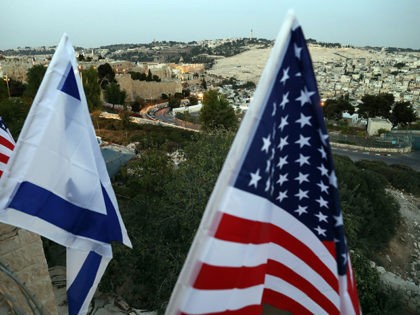(Total Views: 291)
Posted On: 01/22/2017 5:08:51 PM
Post# of 52075
Trump to Announce U.S. Embassy Move to Jerusalem Monday

Numerous unconfirmed reports are circulating in the international media that President Donald Trump intends announcing Monday that he will relocate the U.S. embassy to Israel from the coastal city of Tel Aviv to the capital city of Jerusalem.
Jerusalem has been Israel’s capital city since its founding in 1948, but most countries have deferred moving the embassy there because the original UN partition plan for the British Mandate proposed Jerusalem as a city under international sovereignty.
Jordan, the Palestinians, and all surrounding Arab nations rejected the UN plan, and the Jordanian army took over the eastern half of Jerusalem in 1948, expelling the Jewish inhabitants of the Old City, where Jews had lived for several millennia.
With that part of the UN plan effectively rejected by Jordan and the Arab world, Israel established its capital in western Jerusalem. Though Palestinians, in theory, claim all of Jerusalem for themselves, the part of Jerusalem west of the 1949 armistice line (the “1967 lines,” or the “Green Line”) will unquestionably remain part of Israel in any peace agreement.
The core of the Arab and Muslim rejection of Jerusalem as Israel’s capital is a rejection of Jewish claims to religious and historical connection to the city itself. Palestinian leader Yasser Arafat once turned down an offer of shared sovereignty over the Temple Mount because, as he told then-President Bill Clinton, he saw the Jewish claim to the holy site as fictitious.
In 1995, Congress mandated that the U.S. move the embassy to Israel through the Jerusalem Embassy Act. The law, however, contained a waiver that allowed the president to keep the embassy in Tel Aviv, acknowledging the supremacy of the executive in determining the foreign policy of the U.S. Trump’s pledge on Monday — if it comes to fruition — would decline that waiver.
Opponents of the decision to move the embassy have warned that it would set off violence in the Arab world. But it would also inspire joyful celebrations in Israel and around the world, as the U.S. would likely inspire other countries to follow its example, and would help Israel cement its national vision of “a free nation in our land, the land of Zion and Jerusalem.”
At the inaugural ceremony itself, Rabbi Marvin Hier of the Simon Wiesenthal Center in Los Angeles stressed the themes of Zion and Jerusalem, quoting from Psalm 137:5: “If I forget thee, O Jerusalem, let my right hand forget its skill.”
President Trump was scheduled to speak to Israeli Prime Minister Benjamin Netnayhu by telephone on Sunday afternoon.
Update: The White House has responded to the reports in the foreign press with a statement indicating that no statement on Jerusalem was “imminent,” and that the administration was “at the very beginning stages of even discussing this subject.”

Numerous unconfirmed reports are circulating in the international media that President Donald Trump intends announcing Monday that he will relocate the U.S. embassy to Israel from the coastal city of Tel Aviv to the capital city of Jerusalem.
Jerusalem has been Israel’s capital city since its founding in 1948, but most countries have deferred moving the embassy there because the original UN partition plan for the British Mandate proposed Jerusalem as a city under international sovereignty.
Jordan, the Palestinians, and all surrounding Arab nations rejected the UN plan, and the Jordanian army took over the eastern half of Jerusalem in 1948, expelling the Jewish inhabitants of the Old City, where Jews had lived for several millennia.
With that part of the UN plan effectively rejected by Jordan and the Arab world, Israel established its capital in western Jerusalem. Though Palestinians, in theory, claim all of Jerusalem for themselves, the part of Jerusalem west of the 1949 armistice line (the “1967 lines,” or the “Green Line”) will unquestionably remain part of Israel in any peace agreement.
The core of the Arab and Muslim rejection of Jerusalem as Israel’s capital is a rejection of Jewish claims to religious and historical connection to the city itself. Palestinian leader Yasser Arafat once turned down an offer of shared sovereignty over the Temple Mount because, as he told then-President Bill Clinton, he saw the Jewish claim to the holy site as fictitious.
In 1995, Congress mandated that the U.S. move the embassy to Israel through the Jerusalem Embassy Act. The law, however, contained a waiver that allowed the president to keep the embassy in Tel Aviv, acknowledging the supremacy of the executive in determining the foreign policy of the U.S. Trump’s pledge on Monday — if it comes to fruition — would decline that waiver.
Opponents of the decision to move the embassy have warned that it would set off violence in the Arab world. But it would also inspire joyful celebrations in Israel and around the world, as the U.S. would likely inspire other countries to follow its example, and would help Israel cement its national vision of “a free nation in our land, the land of Zion and Jerusalem.”
At the inaugural ceremony itself, Rabbi Marvin Hier of the Simon Wiesenthal Center in Los Angeles stressed the themes of Zion and Jerusalem, quoting from Psalm 137:5: “If I forget thee, O Jerusalem, let my right hand forget its skill.”
President Trump was scheduled to speak to Israeli Prime Minister Benjamin Netnayhu by telephone on Sunday afternoon.
Update: The White House has responded to the reports in the foreign press with a statement indicating that no statement on Jerusalem was “imminent,” and that the administration was “at the very beginning stages of even discussing this subject.”

